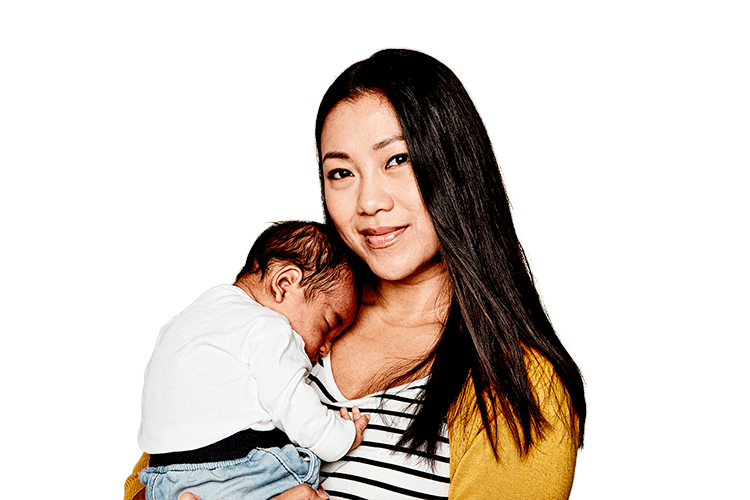Falling pregnant can be a time of jubilation. But for many parents, that jubilation doesn’t extend to nine months – early pregnancy loss (miscarriage) and ectopic pregnancies will dash the dreams of hundreds of Australian women every day.
For those women and their partners, losing a baby will be a huge emotional upheaval, with so many different feelings at play. Shock and grief, irrational guilt and anxiety about future pregnancies are all natural responses to the loss.
Knowing what the signs are, and what you might experience both physically and emotionally, is important.

First, let’s define what early pregnancy loss is: it’s loss of your baby before 20 weeks, and most often before 12 weeks. (The loss of a baby after 20 weeks is considered as a stillbirth.) About 20 per cent of known pregnancies end in miscarriage; even more end before the mother knew she was pregnant.
“We don't talk about how common miscarriage is, and how normal it is for the body to create something that isn’t quite right … and allow it to miscarry,” says Dr Danielle Wilkins, director of maternity services at Cabrini Health. “It is very, very sad, but it is also normal.”
Women often blame themselves for their pregnancy loss, thinking that they’ve done something wrong to cause the loss of their baby. But there’s no evidence to suggest that factors such as exercise, stress or even having sex lead to early pregnancy loss.
The single most common cause is the embryo failing to develop properly due to a random error in its chromosomes – this is spontaneous, and not inherited from either parent. Other causes include hormonal abnormalities, immune system and blood-clotting issues, medical conditions such as diabetes and high fevers caused by severe infections.
What happens when you have a miscarriage
Bleeding and strong cramping are the most common signs of a pregnancy loss, And it’s imperative you seek medical advice if you have these symptoms.However, many women experience light bleeding in early pregnancy and, if a foetal heartbeat can be picked up during an ultrasound, there’s a 95 per cent chance the pregnancy will continue.
If you do have a miscarriage and the bleeding and cramping taper off, it usually means all the pregnancy tissue has left your womb. Typically, a check-up with your doctor or midwife is all you need.
However, if you have a fever, ongoing or heavy bleeding, or increasing pain, it might be an ‘incomplete’ miscarriage. This means pregnancy tissue hasn’t come away from the uterus. Another possibility is a ‘missed miscarriage’: your body hasn’t realised the foetus has died. You may still feel pregnant and it may not be discovered until you have a routine scan.
If the pregnancy tissue hasn’t passed, as with an incomplete or missed miscarriage, discuss your options with your doctor or midwife. These include:
- wait and see (expectant management)
- take medication to empty the uterus (medical management)
- have a D&C to physically remove the uterine contents (surgical management).
Dr Wilkins says women can choose whichever option they prefer, provided it’s appropriate for their condition. “I think as long as women understand the pros and cons to each of those particular treatments, they can make a well-educated choice and they’ll cope reasonably well.”
What happens in an ectopic pregnancy
Occasionally, fertilised eggs implant outside the uterus, usually in the fallopian tube. Because the tube can’t stretch, the pregnancy can’t continue.
Discovering an ectopic pregnancy from symptoms alone – like pain on one side of your abdomen, vaginal bleeding, shoulder tip pain, diarrhoea and vomiting – isn’t easy. But you should seek urgent medical advice from your treating team if you have these symptoms.
About 1 in 100 pregnancies is ectopic. In around half of these there is no obvious risk factor for ectopic pregnancy. But some factors that increase the odds are:
- previous infection, such as chlamydia
- fertility treatment like IVF
- previous surgery, including caesarean section and appendix removal
- being over 35.
Again, your doctor may offer you options to wait and see, have medication that stops the embryo developing, or surgery. If you need surgery, the doctor may either remove the pregnancy from the tube, or remove the tube.
“Either of those surgical treatments do make it a little bit complicated for further pregnancies,” says Wilkins. “Anybody who had one ectopic should be monitored very closely in subsequent pregnancies.”
Your next pregnancy
If you want to try to fall pregnant again after a pregnancy loss, you may be wondering if you need medical clearance. Wilkins says there are often things women want to discuss before their next pregnancy, like improving their pre-conception health. If you’ve had a complete pregnancy loss with no complications, there’s no medical reason to seek clearance, although it’s a good idea to have a follow up with your doctor 4-6 weeks afterwards.
Be reassured that it’s very normal to feel anxious about your next pregnancy. Although the chance of a second miscarriage is still only 1 in 10, the statistics may not reassure grieving women.
“It’s a really tricky time for them because they’ve lost faith in their body and in the process. And it’s really difficult to accept this next pregnancy is going to be a healthy one,” Wilkins explains.
Fears about another pregnancy loss often stop couples announcing the pregnancy to friends and family until the end of the first trimester. But to support prospective parents earlier on, Wilkins wants to see this change.
“If a couple did have an unsuccessful pregnancy, they would want those people to be there to support them. I’d really like to let people know it's okay to share their news as soon as they’re comfortable sharing, and there's no golden rule about waiting until 12 or 13 weeks.”
There are rare cases where women go on to have multiple pregnancy losses, known as recurrent miscarriage. It’s important to remember that recurrent pregnancy loss affects less than 1 per cent of women. Your GP is the first point of contact: they will likely refer to you to specialists for further investigation.
Remember to ask for help
It’s important to recognise the emotional effects of losing a pregnancy. Sadness, guilt, regret, anger, relief, shock, anxiety and loneliness are all common feelings. Visit PANDA or call their helpline on 1300 726 306 for support, or Beyond Blue on 1300 224 636.
Need a little extra support?
Health Concierge
Eligible members with hospital cover can now talk to a member of our Health Concierge team for advice and guidance on how to have a healthy pregnancy, at no extra cost on 1800 789 414.#
Got a health question? 24/7 Medibank Nurse Support
Medibank health insurance members can chat to a registered nurse over the phone or online to discuss any health questions or concerns at no extra cost.~ Chat online or call 1800 644 325 24 hours a day, 7 days a week.
24/7 Medibank Mental Health Support
Medibank members with health insurance can talk with a mental health professional over the phone or online in relation to any mental health or emotional concern at no extra cost.~ Log in or call 1800 644 325, 24 hours a day 7 days a week.
Looking for something else?
Visit Medibank Planning, Pregnancy and Parenting for a range of tools and advice to help you at every stage of your pregnancy journey.
Help the way you want it
Contact us
Call us on 134 190 to speak to a consultant. Alternatively, chat to us 24/7 online.
Self-service options
Login to MyMedibank or Download the MyMedibank App for self service options.
Find a specialist
Find a specialist or Member's choice hospital using our find a provider tool.

Things you should know
~ Some referred services may involve out of pocket costs and waiting periods may apply.
# Health Concierge is available to all eligible Medibank members who hold hospital cover. Excludes Overseas Visitor Health Cover, Working Visa Health Cover and Overseas Student Health Cover (OSHC). Some referred services may involve out of pocket costs.
While we hope you find this information helpful, please note that it is general in nature. It is not health advice, and is not tailored to meet your individual health needs. You should always consult a trusted health professional before making decisions about your health care. While we have prepared the information carefully, we can’t guarantee that it is accurate, complete or up-to-date. And while we may mention goods or services provided by others, we aren’t specifically endorsing them and can’t accept responsibility for them. For these reasons we are unable to accept responsibility for any loss that may be sustained from acting on this information (subject to applicable consumer guarantees).